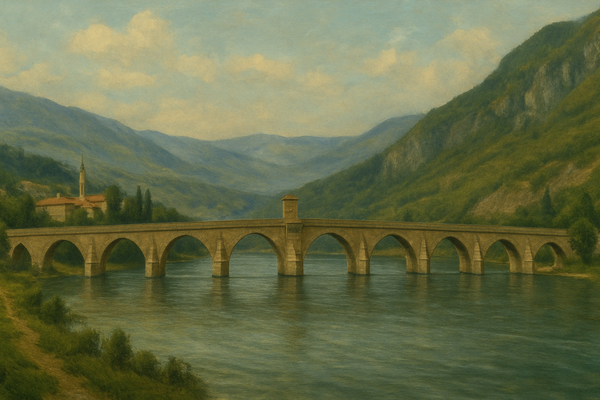🔴 Viewpoint: On how Jules Verne made me love Science (Fiction)
Perhaps Verne's most enduring legacy is the way he inspired generations of young people to embrace science and explore the world around them.

Jules Verne was one of the greatest novelists of the 19th century. His books are known for their scientific accuracy, adventurous plots, and fantastical themes. The French author is even considered one of the founding fathers of science fiction literature. His visionary tales of adventure, exploration, and futuristic inventions have inspired countless readers and writers and shaped the genre's themes and tropes to this day. As a young reader, I had the privilege of discovering Verne's novels and, to my delight, falling in love with science fiction.
Growing up, I was always particularly interested in and fond of fantastic worlds and speculative plots. I welcomed and embraced realistic stories, biographies, and historical accounts, as well, but truly enjoyed books that opened my mind to wonders and possibilities. What I found between the pages of Verne's novels was nothing short of a revelation. Verne was one of the first writers to explore the possibilities of science and technology in his writing. He wrote about submarines, space travel, and other futuristic technologies long before they were ever invented or even imagined. His works helped to establish many of the common themes and tropes that we associate with science fiction today, including space travel, time travel, and exploration of the unknown.
Verne was also a pioneer in the use of science fiction as a means of exploring philosophical and ethical questions. His works often raised questions about the nature of humanity, the limits of scientific knowledge, and the role of technology in society. His imaginative ideas, attention to scientific accuracy, and skillful storytelling helped to shape the genre and inspire generations of writers and readers like myself.
In "Journey to the Center of the Earth" (1867), my second reading by Verne, the story of Professor Lidenbrock and his nephew Axel, who embark on a perilous journey to the depths of the earth, captured my imagination and took me on a thrilling ride through geological wonders, ancient artifacts, and bizarre creatures. Verne's vivid descriptions of the underground landscape, the challenges and dangers the explorers face, and the scientific explanations behind their discoveries fascinated me and made me want to learn more about geology, biology, and physics.
After finishing "Journey to the Center of the Earth," I devoured "Twenty Thousand Leagues Under the Sea" (1871), the story of Captain Nemo and his submarine, the Nautilus, exploring the depths of the ocean and the creatures that live there, encountering everything from giant squids to underwater landscapes. I moved on to "From the Earth to the Moon" (1868) with a group of men who built a giant cannon to shoot a spacecraft to the moon. A book written way before the first moon landing and an excellent example of Verne's ability to predict scientific advancements.
"Around the World in Eighty Days" (1873) followed Phileas Fogg and his valet, Passepartout, as they attempted to circumnavigate the globe in just 80 days, in a classic adventure story that is an excellent example of Verne's ability to capture his readers' imaginations. "The Adventures of Captain Hatteras" (1866) told the story of Hatteras and his crew as they attempt to reach the North Pole. A book full of adventure and suspense and an excellent example of the excitement of exploration. ”Robur the Conqueror" (1886) featured an inventor named Robur and his flying machine, the Albatross, and explored themes of technology and the dangers of its misuse.
These and many other titles by Verne each revealed new wonders, challenges, and technologies, but beyond their sense of adventure and entertainment, Verne's novels also touched on deeper themes. Verne's stories had social and political messages, and he used his stories to comment on issues such as imperialism, environmentalism, social justice, the human spirit of exploration, the relationship between man and nature, and the consequences of progress and innovation.
”Michael Strogoff" (1876) was a historical adventure set in 19th century Russia, following the story of a courier for the Tsar, and his journey across Siberia to deliver an important message. The book explores themes of loyalty and bravery in the face of danger. ”The Master of the World" (1904) explored themes of power and control, by telling the story of a madman who builds a powerful machine and uses it to terrorize the world. A cautionary tale about the dangers of unchecked ambition. "The Begum's Fortune" (1879) explored themes of utopian societies and the dangers of uncontrolled industry, in the story of a group of men who discover a fortune left behind by a wealthy begum and the consequences of their actions. ”Facing the Flag" (1896) was all about patriotism and the responsibility of power, as it told the story of a scientist who created a powerful weapon and the consequences of its use. Another cautionary tale, this time about the dangers of unchecked nationalism.
A word about The Mysterious Island
Jules Verne has undoubtedly written numerous thrilling books that transported readers like me to fascinating worlds. We all have to start somewhere, though, and for me, that happened to be "The Mysterious Island" (1874), which I first read at the age of 9-10. At the time, I had no idea the novel was a crossover sequel to "Twenty Thousand Leagues Under the Sea", and I would only find out later about its connection to "In Search of the Castaways" (1867-68), but I will leave that for readers to discover. It still stands out as one of my favorite books by Verne. There are many personal reasons for it, and I will share a few of them and why it should be on your reading list.
The story is incredibly captivating. The novel follows five men who escape from a Confederate prison camp during the American Civil War by stealing a hot air balloon. During their escape, they are propelled by a fierce storm that takes them off course, and they eventually land on a mysterious island. They soon realize that they are the only inhabitants of the island and must work together to survive. The story of their survival and exploration of the island is thrilling and keeps readers engaged from beginning to end. Back then, the novel's premise of a group of people stranded on a mysterious island in the middle of the Pacific Ocean, filled with strange creatures and natural wonders, was by itself both intriguing and captivating. The vivid descriptions of the island and its flora and fauna drew me in and made me feel like I was there.
The diverse cast of characters all had unique personalities and motivations that kept me engaged in their story. The characters are well-developed and easy to relate to. Each of the five castaways has their own unique personality and skill set, which is essential to their survival on the island. The themes of survival, friendship, and adventure all resonated with me on a personal level. Because the character development is excellent, I couldn't help but root for these characters as they face incredible challenges.
Captain Cyrus Harding is a military man who leads the group, and his intelligence and leadership skills play a crucial role in their survival. The ladies' man, Pencroft, brings his expertise in farming, while the journalist, Gideon Spilett, uses his skill with words to keep a detailed account of their journey. The trio is complemented by an engineer, Herbert, and the mysterious Ayrton, a castaway from a previous expedition to the island. Together, the characters use their skills to overcome the challenges that the island presents to them. The way the characters solved problems and overcame challenges using their ingenuity and resourcefulness was inspiring. The book's message about the power of collaboration and teamwork to overcome seemingly insurmountable obstacles was uplifting.
To a young kid, "The Mysterious Island" also had a sense of mystery and adventure that was hard to find in other books. The island is full of secrets, and the characters must solve various puzzles and unveil the island's mysteries to survive. The book is full of unexpected twists and turns, which adds to the thrill of the story. The plot's surprising revelations kept me on the edge of my seat and wanting to know what would happen next.
And then, the science. The book is full of scientific knowledge that remains relevant today. Jules Verne was known for his accurate scientific descriptions and predictions of future technology, and this book is no exception. The novel incorporates a variety of scientific concepts and explanations, making it educational and informative for readers.
In the novel, the characters resort to chemistry to create gunpowder, which they use for hunting and defense. Verne explains the chemical reactions involved in making gunpowder, such as combining sulfur, charcoal, and saltpeter.
They use their knowledge of botany to identify and use plants on the island for food and medicine. Verne describes the different plants they encounter, such as the breadfruit tree, the bamboo, and the banyan tree.
Likewise, they use their knowledge of meteorology to predict and prepare for weather patterns, such as storms and hurricanes. Verne explains how they use a barometer to measure air pressure and determine changes in the weather.
They explore the island's geology and discover natural wonders such as hot springs and volcanic eruptions. Verne provides scientific explanations for these phenomena and describes the different types of rocks and minerals they encounter.
The characters use physics to solve problems as well, such as creating a pulley system to move heavy objects. Verne explains the physics behind the pulley system, such as the principle of mechanical advantage.
Overall, Verne's use of scientific concepts and explanations in "The Mysterious Island" not only adds to the realism of the novel but also provides educational value for readers. By incorporating these scientific concepts into the story, Verne encourages readers to learn and appreciate the natural world around them. The book teaches readers the importance of science and how it can be applied to everyday life. Its portrayal of the island as both beautiful and dangerous captured my imagination and made me want to explore new places and experiences. The way the story blended elements of science fiction, adventure, and mystery created a unique and memorable reading experience.
Falling in love with Science
Jules Verne's works have been translated into numerous languages and adapted into countless movies, television shows, and comic books. But perhaps Verne's most enduring legacy is the way he inspired generations of young people to embrace science and explore the world around them.
Verne's most famous novels are packed with adventure, exploration, but also scientific discovery. His characters were not just heroes, but also scientists, using their wits and creativity to overcome obstacles and solve problems. He must have believed that science was an essential part of human progress and that children should be encouraged to explore and experiment. His books were filled with scientific details and facts, often presented in a way that made them easily understood and exciting.
In truth, what I came to appreciate about Verne's books was not only their imaginative and entertaining plots but also their scientific accuracy and attention to detail. Verne was a keen observer and researcher, well-versed in geography, astronomy, oceanography, and other fields. He consulted experts and sources to ensure that his stories were plausible and informative, as well as exciting. As a result, his novels are not only great fun but also educational, and they sparked my curiosity and thirst for knowledge.
Verne's books exposed me to the wonders of science and technology and made me realize that the possibilities were endless. Reading Jules Verne's books made me fall in love with science not only because they were exciting and imaginative, but also because they challenged me to think beyond what I knew and to embrace the unknown.
Verne's writing was particularly effective in capturing the imagination of young readers like me. His books were filled with exciting adventures and thrilling discoveries that were grounded in science and logic. This helped to make science seem less intimidating and more accessible, demystifying and making it more approachable.
His portrayal of scientists and engineers in his books was also groundbreaking for its time. Instead of depicting them as eccentric or mad, as was often the case in the literature of the era, Verne's characters were rational, logical, and highly capable individuals who used their scientific knowledge to solve problems and overcome challenges. Through his works, Verne presented science and engineering as exciting and important pursuits, ones that could lead to great discoveries and advancements for humanity. His characters were often seen as heroes, admired for their intelligence, courage, and ingenuity. This portrayal of scientists and engineers helped to make these fields seem more intelligible and desirable. In my opinion, his influence made many young people look up to scientists and engineers as inspiration.
Jules Verne was also known for his ability to imagine future technology that was far beyond the capabilities of his time. From submarines to flying machines and electric-powered devices, his stories featured innovative machines and gadgets that captured my imagination. Seeing these inventions come to life on the page sparked an interest in engineering and technology. And while they may have seemed like science fiction at the time, many of Verne's ideas eventually became reality. Reading about these futuristic technologies inspired me to imagine new possibilities for the future, some of which I have been fortunate to witness.
His stories also often emphasize the importance of scientific inquiry and the pursuit of knowledge. His characters are curious and passionate about learning and are not afraid to take risks to expand their understanding of the world. This inspired me to value education and to pursue my intellectual interests. The stories also often combine elements of science, technology, history, and geography, which made me explore these subjects in greater depth. This multidisciplinary approach helped me see the connections between different fields of study and always made me pursue a well-rounded education.
Jules Verne was a true visionary who inspired and encouraged me to step outside of my comfort zone, feed my curiosity, and discover the beauty and mystery of the world. His works fostered my creative and critical thinking. They instilled a lifelong love of science and exploration in me, by providing thrilling and imaginative storylines, depicting accurate science and technology, providing role models in science and engineering, encouraging experimentation, and portraying positive visions where scientific progress has led to improved living conditions, increased knowledge, and new discoveries. This has made me support the potential of science and technology to solve real-world problems and create a better future. It is my firm belief that his work remains relevant today, and his contribution to science education, science fiction and popular culture will continue to be celebrated for generations to come.
🔴 Viewpoint is a random series of spontaneous considerations about subjects that linger in my mind just long enough for me to write them down. They express my own often inconsistent thoughts, ideas, assumptions and speculations. Nothing else. Quote me at your own peril.





